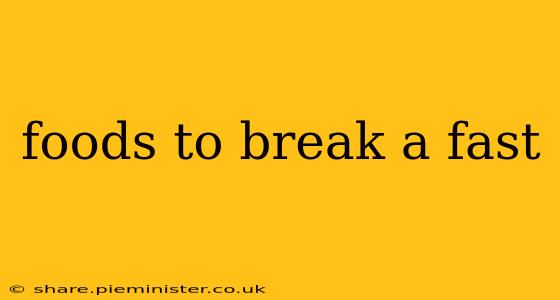Breaking a fast, whether it's a short intermittent fast or a longer-term water fast, requires a thoughtful approach. Rushing back into eating can lead to digestive upset and negate the potential benefits of your fasting period. The key is to gently reintroduce nutrients to your system. This guide will explore the best foods to break a fast, addressing common concerns and providing practical advice.
What are the best foods to break a fast with?
The ideal foods to break a fast are generally easy to digest, nutrient-rich, and gentle on the stomach. Avoid heavy, greasy, or overly processed foods. Instead, opt for:
- Bone Broth: This is a fantastic option for reintroducing nutrients and electrolytes after a fast. It's gentle on the digestive system and packed with minerals.
- Coconut Water: Naturally hydrating and rich in electrolytes, coconut water helps replenish fluids and minerals lost during fasting.
- Fruit (especially berries and bananas): These offer natural sugars for energy and essential vitamins and minerals. Berries are low in sugar compared to other fruits.
- Smoothies: Blend fruits, vegetables, and perhaps some healthy fats (like avocado or nut butter) for a nutrient-packed and easily digestible meal.
- Vegetable Juice: Provides vitamins, minerals, and hydration without overwhelming your system.
- Lightly cooked vegetables: Steamed or lightly sautéed vegetables are easily digestible and provide essential nutrients.
What should I avoid when breaking a fast?
After a fast, your digestive system is sensitive. Avoid these foods:
- Heavy, greasy foods: Fried foods, fatty meats, and rich sauces can overwhelm your digestive system.
- Processed foods: These often lack nutrients and are hard to digest.
- Large meals: Start with small portions and gradually increase your food intake.
- Sugary drinks: These can cause a blood sugar spike and crash.
- Alcohol: Alcohol can dehydrate you and irritate your digestive system.
- Dairy: Some individuals find dairy difficult to digest, especially after a fast. Start with small amounts if you choose to include it.
How long should I wait before eating after a fast?
The length of your fast will influence your refeeding strategy. For shorter intermittent fasts (12-16 hours), you may not need a specific refeeding plan. However, after longer fasts (24 hours or more), a gradual reintroduction of food is recommended. Listen to your body – if you feel hungry, start with a small amount of easily digestible food.
What are the benefits of a gentle approach to breaking a fast?
A gradual reintroduction of food after a fast offers several benefits:
- Improved Digestion: It prevents digestive upset and discomfort.
- Better Nutrient Absorption: Your body can efficiently absorb the nutrients from easily digestible foods.
- Stable Blood Sugar Levels: Avoids blood sugar spikes and crashes.
- Enhanced Energy Levels: Provides sustained energy without the roller coaster effect of sugary foods.
Does breaking a fast need to be gradual?
While a gradual approach is generally recommended, especially after longer fasts, the extent of gradualness depends on individual tolerance and the duration of the fast. For shorter fasts, you might be able to tolerate a slightly larger meal. Listen to your body's signals and adjust your approach accordingly.
What are some common mistakes people make when breaking a fast?
- Eating too much too soon: Overloading your digestive system can lead to discomfort and negate the benefits of fasting.
- Consuming processed or unhealthy foods: These choices can cause digestive upset and hinder nutrient absorption.
- Ignoring your body's signals: Pay attention to your hunger and fullness cues.
- Not staying hydrated: Ensure adequate fluid intake throughout the refeeding process.
This guide provides a general framework. Individual needs may vary, and consulting a healthcare professional or registered dietitian is always recommended, especially before starting a prolonged fast or if you have underlying health conditions. Remember that consistency and listening to your body are crucial for successfully breaking a fast and maximizing its potential benefits.
